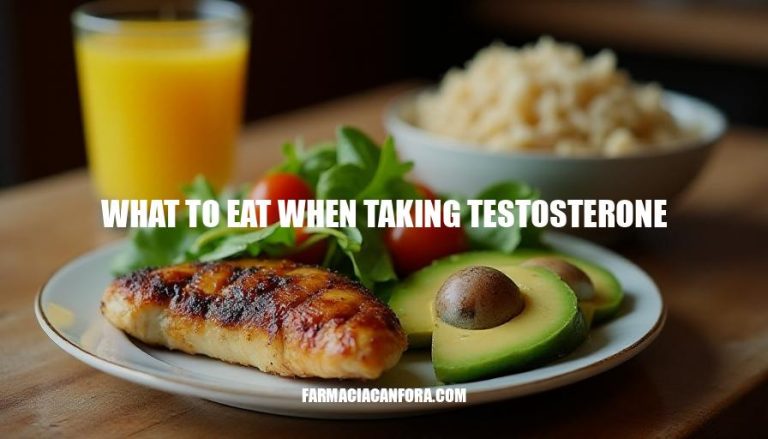


When you’re on testosterone therapy, what you eat matters a lot. Eating the right foods can help your body work better with the treatment. It can also reduce any side effects and make the whole process more effective.
Testosterone is a crucial hormone for both men and women, playing a significant role in muscle mass, bone density, and overall vitality. When taking testosterone, it’s essential to support your body with the right nutrients to maximize its benefits and maintain hormone balance. Here are some specific foods and their benefits:
Protein is vital for muscle growth, repair, and overall health.
It helps maintain muscle mass, especially when taking testosterone. Some excellent protein-rich foods include:
Lean Meats: Chicken, turkey, and lean cuts of beef provide high-quality protein and essential amino acids.
Fish: Salmon, tuna, and mackerel are rich in protein and omega-3 fatty acids, which support heart health and reduce inflammation.
Eggs: A complete protein source, eggs also contain vitamin D, which is essential for testosterone production.
Dairy Products: Greek yogurt, cottage cheese, and milk are excellent sources of protein and calcium, supporting bone health.
Legumes: Beans, lentils, and chickpeas are plant-based protein sources that also provide fiber and essential nutrients.
Healthy fats are crucial for hormone production, including testosterone. They also support brain health, reduce inflammation, and provide long-lasting energy.
Some healthy fat sources include:
Avocados: Rich in monounsaturated fats, avocados support hormone production and provide essential vitamins like vitamin E.
Nuts and Seeds: Almonds, walnuts, flaxseeds, and chia seeds are excellent sources of healthy fats, fiber, and protein.
Olive Oil: A staple of the Mediterranean diet, olive oil is rich in monounsaturated fats and antioxidants.
Fatty Fish: Salmon, sardines, and mackerel provide omega-3 fatty acids, which support heart health and reduce inflammation.
Coconut Oil: Contains medium-chain triglycerides (MCTs) that provide quick energy and support metabolic health.
Certain vitamins and minerals are vital for hormone balance and overall health. These include:
Vitamin D: Supports testosterone production and bone health. Sources include fatty fish, fortified dairy products, and sunlight exposure.
Vitamin B6: Helps regulate mood and reduce PMS symptoms.
Found in poultry, bananas, and fortified cereals.
Vitamin B12: Essential for energy production and nervous system function. Found in meat, fish, dairy, and fortified plant-based products.
Vitamin E: An antioxidant that protects hormone-producing glands. Found in nuts, seeds, and spinach.
Magnesium: Supports adrenal function and reduces cortisol levels.
Found in dark leafy greens, nuts, and whole grains.
Zinc: Essential for testosterone production and immune function. Found in shellfish, legumes, and pumpkin seeds.
Breakfast: Start your day with a protein-rich breakfast like scrambled eggs with spinach and avocado, or Greek yogurt with nuts and berries.
Snacks: Keep healthy snacks on hand, such as a handful of almonds, a piece of fruit with nut butter, or a protein smoothie with spinach and flaxseeds.
Lunch: Opt for a balanced meal like a grilled chicken salad with mixed greens, avocado, and olive oil dressing, or a quinoa bowl with black beans, vegetables, and a squeeze of lime.
Dinner: Include a source of lean protein, healthy fats, and vegetables. For example, baked salmon with roasted sweet potatoes and steamed broccoli, or a stir-fry with tofu, colorful veggies, and a sprinkle of sesame seeds.
Hydration: Drink plenty of water throughout the day to support overall health and hormone balance.
Herbal teas and infused water with lemon or cucumber can add variety.
By incorporating these nutrient-dense foods into your daily meals and snacks, you can support hormone balance, overall health, and maximize the benefits of taking testosterone.
When taking testosterone, it’s essential to fuel your body with nutrient-dense foods to maximize its benefits and maintain hormone balance. A balanced diet rich in protein, healthy fats, and essential vitamins and minerals can help support muscle growth, bone density, and overall vitality.
It’s crucial to remember that everyone’s nutritional needs are different, and it’s best to consult with a healthcare professional for personalized dietary advice. By working together with your healthcare team and making informed food choices, you can optimize the effectiveness of testosterone therapy and achieve optimal health outcomes.